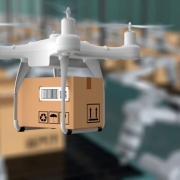AI and machine learning in logistics and WMS
Artificial intelligence and machine learning are increasingly being used in various sectors. In logistics and warehouse management systems (WMS), AI and machine learning are used to perform predictive analyses. With these developments, companies can, for example, adjust their inventory levels more accurately to demand with demand forecasts. In this article, we delve deeper into how AI and ML are applied in the logistics sector and WMS.
What is artificial intelligence (AI) and machine learning (ML)?
Artificial Intelligence
Artificial intelligence encompasses the ability of computer systems to perform tasks that typically require human intelligence. This includes tasks such as problem-solving, learning, planning, speech recognition, and much more.
Machine Learning
Machine learning is a subgroup of artificial intelligence where computer systems have the ability to learn and improve from experiences without being explicitly programmed. Machine learning algorithms identify patterns in data and make predictions or decisions based on those patterns.
Application in logistics and WMS
Predictive analytics for inventory management
One of the most prominent applications of AI and ML in logistics and WMS is the use of predictive analytics for inventory management. By analyzing historical data, AI algorithms can make accurate predictions about the demand for certain products. This allows companies to better align their inventory levels with demand, resulting in fewer inventory surpluses or shortages.
Optimization of route planning and deliveries
AI and ML can also be used to optimize route planning and deliveries. By taking into account factors such as traffic patterns, weather conditions, and delivery priorities, algorithms can determine the most efficient routes for trucks and delivery vehicles. This results in shorter lead times, lower fuel costs, and improved delivery experience for customers.
Improvement of efficiency in warehouses
In warehouses, AI and ML play a crucial role in optimizing processes and improving efficiency. By utilizing advanced automation technologies such as automated sorting systems, robotics, and drones, warehouses can increase their throughput capacity and reduce labor costs.
Benefits of AI and ML in logistics and WMS
Cost reduction and error minimization
One of the key benefits of AI and machine learning in logistics is the ability to reduce costs and minimize errors. By automating and optimizing processes, companies can lower operational costs while improving accuracy and reliability.
Improved customer satisfaction
By offering faster deliveries, better inventory levels, and improved overall service quality, companies can significantly enhance customer satisfaction. It enables companies to meet the ever-increasing expectations of consumers and gain a competitive advantage.
Increased operational efficiency
Companies can increase their operational efficiency by streamlining and optimizing processes. This leads to shorter lead times, less waste of resources, and an overall improvement in business performance.
Challenges and limitations
Data quality and reliability
One of the main challenges companies face when implementing AI and machine learning in logistics is ensuring the quality and reliability of data. Because algorithms rely on accurate and reliable data, it is essential for companies to have systems and processes in place to ensure the quality of their data.
Integration with existing systems
Integrating this technology into existing logistics systems can be a challenging task. Many companies deal with legacy systems, which are systems where the software was developed in the past and is no longer updated. They were not designed with new technologies in mind, which can lead to compatibility issues and complex integration processes.
Privacy and ethical considerations
Additionally, these developments also bring important privacy and ethical considerations. Companies must ensure they comply with relevant data privacy regulations and consider the ethical implications of using AI and machine learning in their business processes.
Future of AI and machine learning
Rise of autonomous vehicles and drones
One of the most interesting developments in AI and machine learning in logistics is the rise of autonomous vehicles and drones. These technologies have the potential to further improve delivery processes by reducing the need for human intervention and increasing the speed and efficiency of deliveries.
Further personalization of logistics processes
Using these technologies, companies can further personalize logistics processes to meet the unique needs and preferences of their customers. By utilizing advanced analytics techniques, companies can gain more insight into their customers’ behavior and offer personalized services and offerings.
In the logistics sector and WMS, artificial intelligence and machine learning play an increasingly important role in optimizing processes, reducing costs, and improving overall efficiency. Although there are challenges, AI and ML offer significant benefits and have the potential to transform the future of logistics.
Curious about what our IT professionals can do for your business regarding AI and machine learning? Then contact Leo Keller via lkeller@g-nius.nl or +31 6 22 30 24 60.






